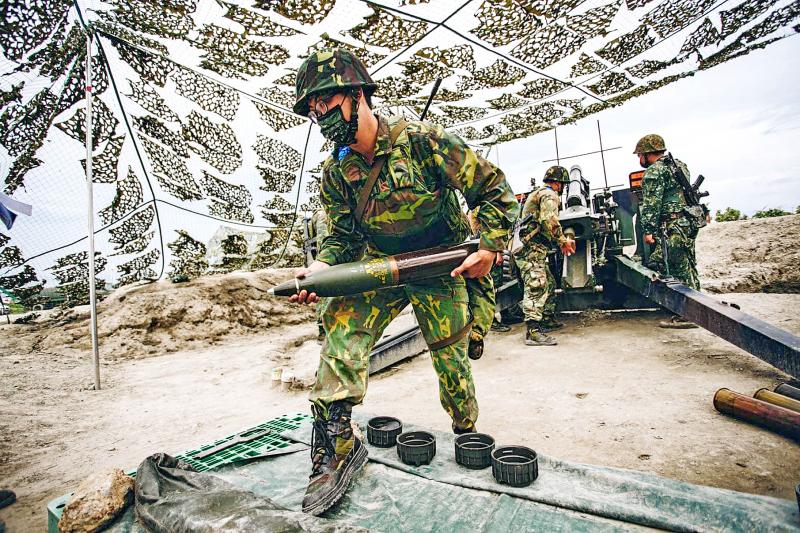The Ministry of National Defense yesterday said that starting next year, the military would introduce new rules governing the call-up of reservists to improve the combat readiness of the nation’s reserve forces.
Under the new policy, call-ups would be for two weeks training rather than the current five to seven days, and could occur every year rather than once every two years, said Han Gan-ming (韓岡明), head of the ministry’s All-out Defense Mobilization Office.
The proposal would begin as a limited two-year trial from next year to 2023, before a full-scale launch in 2024, Han said.

Photo: Screen grab from Facebook
Starting this year, the military is also extending the period during which reservists can be called up from a maximum of four times in eight years to four times in 12 years after being discharged, to ensure the nation has a large enough reserve force.
Taiwan has 770,000 all-male reservists and the new changes are expected to affect 3,000 of them, Han said.
Minister of National Defense Yen De-fa (嚴德發) last year said that the ministry was taking measures to ensure the nation’s military reserve force is a more reliable backup for regular forces in protecting the country amid increased Chinese military maneuvers around Taiwan.
The measures include increasing the potential frequency and duration of each call-up, providing better equipment and scaling up reservist training, Yen said.
At present, reservists are called up every two years for training at a military base near their residence to maintain basic combat skills.
Reservist training includes specialty retraining, firearms training, combat training, combined training, and disaster prevention and relief training, which are necessary for combat operations and disaster relief, the ministry said.

A Chinese aircraft carrier group entered Japan’s economic waters over the weekend, before exiting to conduct drills involving fighter jets, the Japanese Ministry of Defense said yesterday. The Liaoning aircraft carrier, two missile destroyers and one fast combat supply ship sailed about 300km southwest of Japan’s easternmost island of Minamitori on Saturday, a ministry statement said. It was the first time a Chinese aircraft carrier had entered that part of Japan’s exclusive economic zone (EEZ), a ministry spokesman said. “We think the Chinese military is trying to improve its operational capability and ability to conduct operations in distant areas,” the spokesman said. China’s growing

Nine retired generals from Taiwan, Japan and the US have been invited to participate in a tabletop exercise hosted by the Taipei School of Economics and Political Science Foundation tomorrow and Wednesday that simulates a potential Chinese invasion of Taiwan in 2030, the foundation said yesterday. The five retired Taiwanese generals would include retired admiral Lee Hsi-min (李喜明), joined by retired US Navy admiral Michael Mullen and former chief of staff of the Japan Self-Defense Forces general Shigeru Iwasaki, it said. The simulation aims to offer strategic insights into regional security and peace in the Taiwan Strait, it added. Foundation chair Huang Huang-hsiung

PUBLIC WARNING: The two students had been tricked into going to Hong Kong for a ‘high-paying’ job, which sent them to a scam center in Cambodia Police warned the public not to trust job advertisements touting high pay abroad following the return of two college students over the weekend who had been trafficked and forced to work at a cyberscam center in Cambodia. The two victims, surnamed Lee (李), 18, and Lin (林), 19, were interviewed by police after landing in Taiwan on Saturday. Taichung’s Chingshui Police Precinct said in a statement yesterday that the two students are good friends, and Lin had suspended her studies after seeing the ad promising good pay to work in Hong Kong. Lee’s grandfather on Thursday reported to police that Lee had sent

A Chinese ship ran aground in stormy weather in shallow waters off a Philippines-controlled island in the disputed South China Sea, prompting Filipino forces to go on alert, Philippine military officials said yesterday. When Philippine forces assessed that the Chinese fishing vessel appeared to have run aground in the shallows east of Thitu Island (Jhongye Island, 中業島) on Saturday due to bad weather, Philippine military and coast guard personnel deployed to provide help, but later saw that the ship had been extricated, Philippine navy regional spokesperson Ellaine Rose Collado said. No other details were immediately available, including if there were injuries among